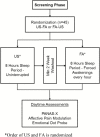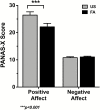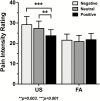Partial Sleep Deprivation Attenuates the Positive Affective System: Effects Across Multiple Measurement Modalities - PubMed (original) (raw)
Partial Sleep Deprivation Attenuates the Positive Affective System: Effects Across Multiple Measurement Modalities
Patrick H Finan et al. Sleep. 2017.
Abstract
Objective: Ample behavioral and neurobiological evidence links sleep and affective functioning. Recent self-report evidence suggests that the affective problems associated with sleep loss may be stronger for positive versus negative affective state and that those effects may be mediated by changes in electroencepholographically measured slow wave sleep (SWS). In the present study, we extend those preliminary findings using multiple measures of affective functioning.
Design: In a within-subject randomized crossover experiment, we tested the effects of one night of sleep continuity disruption via forced awakenings (FA) compared to one night of uninterrupted sleep (US) on three measures of positive and negative affective functioning: self-reported affective state, affective pain modulation, and affect-biased attention.
Setting: The study was set in an inpatient clinical research suite.
Participants: Healthy, good sleeping adults (N = 45) were included.
Measurement and results: Results indicated that a single night of sleep continuity disruption attenuated positive affective state via FA-induced reductions in SWS. Additionally, sleep continuity disruption attenuated the inhibition of pain by positive affect as well as attention bias to positive affective stimuli. Negative affective state, negative affective pain facilitation, nor negative attention bias were altered by sleep continuity disruption.
Conclusions: The present findings, observed across multiple measures of affective function, suggest that sleep continuity disruption has a stronger influence on the positive affective system relative to the negative affective affective system.
Keywords: affect; attention; depression; emotion; pain; sleep.
© Sleep Research Society 2016. Published by Oxford University Press on behalf of the Sleep Research Society. All rights reserved. For permissions, please e-mail journals.permissions@oup.com.
Figures
Figure 1
Experimental design.
Figure 2
Effects of sleep continuity disruption on positive and negative affects. Means and standard errors of the means are presented for positive affect (PA) and negative affect (NA) reported following one night of uninterrupted sleep (US) and one night of forced awakenings (FA).
Figure 3
Effect of sleep continuity disruption on positive affect is mediated by loss of slow wave sleep. Regression coefficients for each main effect are presented for each path.
Figure 4
Effects of sleep continuity disruption on affective pain modulation. Means and standard errors of the means are presented for pain intensity associated with positive, negative, and neutral affective conditions, following one night of uninterrupted sleep (US) and one night of forced awakenings (FA).
Similar articles
- Experimental sleep disruption and reward learning: moderating role of positive affect responses.
Finan PH, Whitton AE, Letzen JE, Remeniuk B, Robinson ML, Irwin MR, Pizzagalli DA, Smith MT. Finan PH, et al. Sleep. 2019 May 1;42(5):zsz026. doi: 10.1093/sleep/zsz026. Sleep. 2019. PMID: 30927744 Free PMC article. - The Effects of Sleep Continuity Disruption on Positive Mood and Sleep Architecture in Healthy Adults.
Finan PH, Quartana PJ, Smith MT. Finan PH, et al. Sleep. 2015 Nov 1;38(11):1735-42. doi: 10.5665/sleep.5154. Sleep. 2015. PMID: 26085289 Free PMC article. Clinical Trial. - Total sleep deprivation reduces top-down regulation of emotion without altering bottom-up affective processing.
Stenson AR, Kurinec CA, Hinson JM, Whitney P, Van Dongen HPA. Stenson AR, et al. PLoS One. 2021 Sep 2;16(9):e0256983. doi: 10.1371/journal.pone.0256983. eCollection 2021. PLoS One. 2021. PMID: 34473768 Free PMC article. - [Sleep deprivation and pain: a review of the newest literature].
Karmann AJ, Kundermann B, Lautenbacher S. Karmann AJ, et al. Schmerz. 2014 Apr;28(2):141-6. doi: 10.1007/s00482-014-1394-6. Schmerz. 2014. PMID: 24643753 Review. German. - Sleep deprivation and pain perception.
Lautenbacher S, Kundermann B, Krieg JC. Lautenbacher S, et al. Sleep Med Rev. 2006 Oct;10(5):357-69. doi: 10.1016/j.smrv.2005.08.001. Epub 2006 Jan 4. Sleep Med Rev. 2006. PMID: 16386930 Review.
Cited by
- Sleep and Pain: A Systematic Review of Studies of Mediation.
Whibley D, AlKandari N, Kristensen K, Barnish M, Rzewuska M, Druce KL, Tang NKY. Whibley D, et al. Clin J Pain. 2019 Jun;35(6):544-558. doi: 10.1097/AJP.0000000000000697. Clin J Pain. 2019. PMID: 30829737 Free PMC article. - Rapid Eye Movement Sleep, Sleep Continuity and Slow Wave Sleep as Predictors of Cognition, Mood, and Subjective Sleep Quality in Healthy Men and Women, Aged 20-84 Years.
Della Monica C, Johnsen S, Atzori G, Groeger JA, Dijk DJ. Della Monica C, et al. Front Psychiatry. 2018 Jun 22;9:255. doi: 10.3389/fpsyt.2018.00255. eCollection 2018. Front Psychiatry. 2018. PMID: 29988413 Free PMC article. - Selective suppression of rapid eye movement sleep increases next-day negative affect and amygdala responses to social exclusion.
Glosemeyer RW, Diekelmann S, Cassel W, Kesper K, Koehler U, Westermann S, Steffen A, Borgwardt S, Wilhelm I, Müller-Pinzler L, Paulus FM, Krach S, Stolz DS. Glosemeyer RW, et al. Sci Rep. 2020 Oct 14;10(1):17325. doi: 10.1038/s41598-020-74169-8. Sci Rep. 2020. PMID: 33057210 Free PMC article. - Eveningness Predicts Negative Affect Following Sleep Restriction.
Cox RC, Olatunji BO. Cox RC, et al. Behav Ther. 2021 Jul;52(4):797-805. doi: 10.1016/j.beth.2020.10.004. Epub 2020 Oct 26. Behav Ther. 2021. PMID: 34134821 Free PMC article. - Experimental sleep disruption and reward learning: moderating role of positive affect responses.
Finan PH, Whitton AE, Letzen JE, Remeniuk B, Robinson ML, Irwin MR, Pizzagalli DA, Smith MT. Finan PH, et al. Sleep. 2019 May 1;42(5):zsz026. doi: 10.1093/sleep/zsz026. Sleep. 2019. PMID: 30927744 Free PMC article.
References
- Baglioni C, Spiegelhalder K, Lombardo C, Riemann D. Sleep and emotions: a focus on insomnia. Sleep Med Rev. 2010; 14(4): 227–238. - PubMed
- Yoo SS, Gujar N, Hu P, Jolesz FA, Walker MP. The human emotional brain without sleep—a prefrontal amygdala disconnect. Curr Biol. 2007; 17(20): R877–R878. - PubMed
- Baglioni C, Battagliese G, Feige B, et al. Insomnia as a predictor of depression: a meta-analytic evaluation of longitudinal epidemiological studies. J Affect Disord. 2011; 135(1-3): 10–19. - PubMed
MeSH terms
Grants and funding
- R21 NS051771/NS/NINDS NIH HHS/United States
- R01 DA032922/DA/NIDA NIH HHS/United States
- R34 DA037005/DA/NIDA NIH HHS/United States
- T32 NS070201/NS/NINDS NIH HHS/United States
- K23 DA035915/DA/NIDA NIH HHS/United States
- P30 NR014131/NR/NINR NIH HHS/United States
LinkOut - more resources
Full Text Sources
Other Literature Sources



